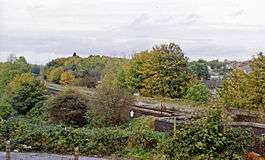Ashley Hill railway station
| Ashley Hill | |
|---|---|
|
Site of the station (1992) | |
| Location | |
| Place | Ashley Down |
| Area | City of Bristol |
| Coordinates | 51°28′42″N 2°34′36″W / 51.4783°N 2.5767°WCoordinates: 51°28′42″N 2°34′36″W / 51.4783°N 2.5767°W |
| Operations | |
| Original company | Bristol and South Wales Union Railway |
| Pre-grouping | Great Western Railway |
| Post-grouping | Great Western Railway |
| History | |
| 13 August 1864 | Station opens |
| 23 November 1964 | Station closes |
| Disused railway stations in the United Kingdom | |
|
Closed railway stations in Britain A B C D–F G H–J K–L M–O P–R S T–V W–Z | |
|
| |
Ashley Hill railway station was a railway station serving the area of Ashley Down in the north of Bristol, England. It was located on what is now known as the Filton line. It was served by stopping trains to Severn Beach (via Pilning), Avonmouth (via Chittening) and Swindon (via Badminton).
History
The station was opened in 1864 by the Bristol and South Wales Union Railway, which was absorbed by the Great Western Railway in 1868. The station passed to the Western Region of British Railways on nationalisation in 1948. It was closed by the British Railways Board in 1964.
| Preceding station | Historical railways | Following station | ||
|---|---|---|---|---|
| Stapleton Road Line and station open |
Great Western Railway Bristol and South Wales Union Railway |
Horfield Line open, station closed | ||
The site today
Trains running between Bristol Temple Meads and Bristol Parkway pass the site. Remains of one of the platforms are clearly visible.
In 2001 the station was selected to be reopened as "Ashley Down" and used as a stop for the proposed Bristol Supertram project. This was planned to operate as a 30-minute service between Broadmead Shopping Centre and North Bristol, but the project was cancelled in 2004.
Future
The line through Ashley Hill is due to be electrified by 2017 as part of the Great Western Main Line electrification project.[1][2] The electrification scheme also includes the four-tracking of Filton Bank, which will allow more services between Parkway and Bristol Temple Meads, and separate fast inter-city services from local stopping services.[3][4]
It was suggested that Ashley Hill station be reopened as part of the Greater Bristol Metro scheme.[5][6] The reopening was supported by Bristol City Council, Network Rail, local MPs and local rail groups,[7] and would have provided rail access to local colleges and to the County Ground, home of Gloucestershire County Cricket Club.[8] However, it was ruled out by Network Rail due to modern regulations regarding the track gradient in stations, and also due to the high cost of removing an embankment.[9][10]
References
- ↑ "Modernising the Great Western" (PDF). Network Rail. Retrieved 9 June 2012.
- ↑ "Bristol to London line to be electrified". This Is Bristol. Northcliffe Media. 23 July 2009. Retrieved 5 April 2012.
- ↑ "Green light for long-awaited rail improvements". The Post, Bristol. Northcliffe Media. 17 July 2012. Retrieved 29 September 2013.
- ↑ Broadbent, Steve (16–29 May 2012). "Ship-shape and Bristol fashion". RAIL. No. 696. pp. 46–53.
- ↑ White, James (13 March 2009). "Item 04: Greater Bristol Metro" (PDF). West of England Partnership. Retrieved 28 December 2011.
- ↑ "Campaign for trains from Bristol Temple Meads every half hour". This is Bristol. Northcliffe Media. 17 January 2012. Retrieved 19 January 2012.
- ↑ "Study to take place into plans for new station". The Bristol Post. Northcliffe Media. 17 September 2013. Retrieved 10 October 2013.
- ↑ Wood, Dave (16 September 2013). "New tracks, new stations will provide opportunities". Retrieved 10 October 2013.
- ↑ "Costs set to signal end of plan to reopen city railway station". Bristol Post. Local World. 6 November 2013. Retrieved 26 November 2013.
- ↑ Johnston, Howard (27 November – 10 December 2013). "Regional News". RAIL. Vol. 736. Haymarket Publishing. p. 24.
- Butt, R. V. J. (1995). The Directory of Railway Stations: details every public and private passenger station, halt, platform and stopping place, past and present (1st ed.). Sparkford: Patrick Stephens Ltd. ISBN 1-8526-0508-1. OCLC 60251199.
- Jowett, Alan (2000). Jowett's Nationalised Railway Atlas (1st ed.). Penryn, Cornwall: Atlantic Transport Publishers. ISBN 0-9068-9999-0. OCLC 228266687.
